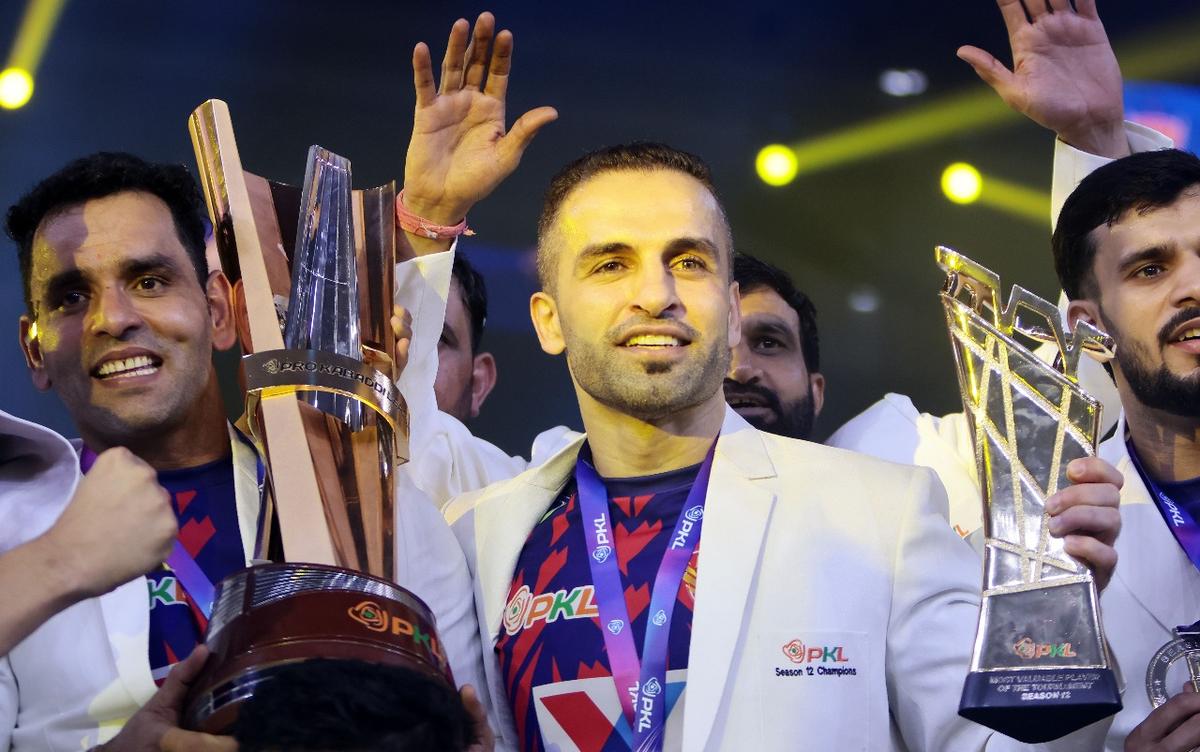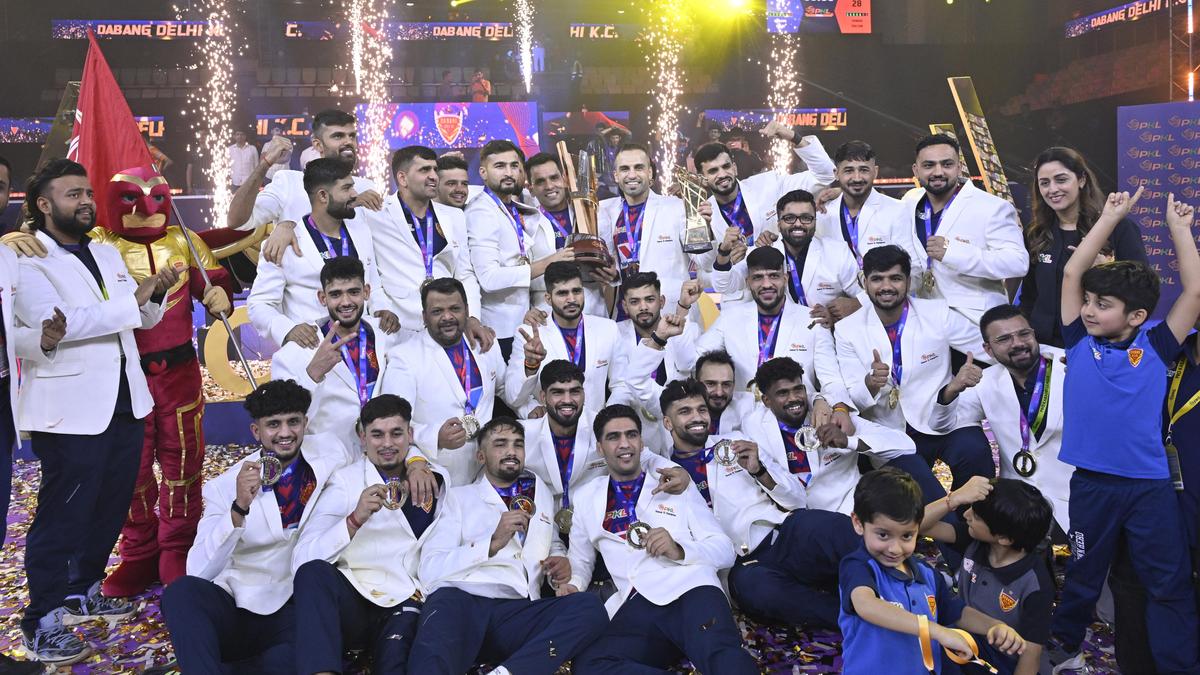Pro Kabaddi League season 12 review: Fine margins and tactical acumen underline competitive season
The 12th season of the Pro Kabaddi League (PKL) will not only be remembered for its thrilling finale but also for the sheer parity and competitive intensity that defined the entire campaign. When the curtains finally fell at the Thyagaraj Indoor Stadium in New Delhi, it was the home side, Dabang Delhi, that stood victorious, clinching its second PKL title with a hard-fought 31-28 victory over the consistent powerhouse Puneri Paltan. Delhi became the first home team since U Mumba in Season 2 to lift the trophy in front of its supporters.
New structure
The season was defined by a critical structural change that injected more pressure into every fixture. The league adopted an expanded format featuring 108 matches and a revamped playoff system that allowed the top eight teams to contend for the title via Play-Ins. Crucially, the tie-breaker rule, previously reserved for knockout matches, was introduced to the league stage, eliminating draws and ensuring that every contest produced a definitive result.
This shift amplified the competition, turning the points table into a perpetually shifting maze. Puneri and Delhi emerged as twin leaders, finishing with identical points. The rest of the table descended into chaos, with the final week deciding even the sixth, seventh, and eighth spots. This parity meant teams could not rely on mid-table safety; every raid, every tackle, and every point difference became critical to survival.
This was a season where tactical depth trumped individual star power. The league was so tightly contested that the two finalists needed tie-breakers to decide the winner in all three meetings before the title-decider.
Crowned conqueror
Dabang Delhi’s path to the championship was nothing short of a masterclass in collective effort and defensive steel. While captain Ashu Malik was the consistent raiding anchor throughout the league, his true value lay in his leadership and composure during high-pressure moments.
The defensive backbone was anchored by veteran Fazel Atrachali, the ‘Sultan from Iran,’ who solidified his legacy as the most successful foreign player in PKL history by clinching his third title and recording his ninth consecutive season with 50-plus tackle points. It was Fazel’s crucial, final-minute ankle hold on the red-hot Aditya Shinde that secured the three-point cushion and the championship.

Fazel Atrachali won his third PKL title, and was named MVP of the tournament.
| Photo Credit:
Special arrangement
Fazel Atrachali won his third PKL title, and was named MVP of the tournament.
| Photo Credit:
Special arrangement
The title also marked a historic milestone for coach Joginder Narwal, who became the first man since Manpreet Singh to win the PKL title as both a player (Season 8 captain) and a head coach.
Paltan’s heartbreak and resilience
For Puneri Paltan, Season 12 was a narrative of near-perfection tragically interrupted. Led by the dynamic Aslam Inamdar and coached by former India captain Ajay Thakur, Paltan finished atop the league table, showcasing a squad depth and balance built for sustained excellence. Its journey to a third final appearance in four seasons reflected a culture that has consistently prioritised building a team rather than chasing star power.
Only three of the 12 teams failed to make a mark this season. Bengal Warriorz and Gujarat Giants endured forgettable campaigns. Both franchises spent over 40 per cent of their purse on single players during the auction, attempting to build teams around them. Yet even ace performers like Devank Dalal and Mohammadreza Chiyaneh Shadloui could not do it all. Poor decision-making from team management and the inability to foster balance resulted in another disappointing season for both sides.
Individual brilliance and season’s best
The season also showcased several standout individual performances. Patna Pirates’ raider Ayan Lohchab amassed 316 raid points, becoming only the fifth player in PKL history to breach the 300-point mark in a single season. Devank continued his fine form, finishing second in the raid charts with 271 points.
Several breakout performers emerged as well. Paltan’s Aditya dazzled with his quick feet, while Bengaluru Bulls’ Alireza Mirzaian displayed remarkable tenacity and skill to cement his place as the next big name in Iranian kabaddi. It wasn’t just the youngsters who shone; experienced campaigners like Bharat Hooda and Vijay Malik also stood out.
Moments of magic
Season 12 also produced moments of sheer brilliance, such as Bulls’ Shubham Bitke’s historic seven-point raid against Patna Pirates. Even teams that missed the knockout stage in previous seasons, like Telugu Titans, experienced moments of redemption by ending their long playoff drought.
Controversies that shook the mat
Despite the on-mat heroics, the season was also marred by controversies. The biggest shock came when Tamil Thalaivas sent home its star player, Pawan Sehrawat, after just three matches for an undisclosed breach of team rules. The Indian national team captain later took to social media, claiming that a member of the management was “calling all the shots.” Later in the season, coach Sanjeev Balyan and captain Arjun Deshwal echoed similar concerns in a press conference. The Thalaivas managed only six wins from 18 league matches and failed to reach the knockouts.
Similarly, captain Ankush Rathee’s sudden exit from the Bengaluru Bulls sparked speculation about internal conflicts.
But the deepest frustration centred on refereeing decisions throughout the season. The peak of this discontent came during the Dabang Delhi versus Haryana Steelers clash, where a disputed time-stoppage ruling allegedly denied Haryana a final raid, resulting in a narrow 38-37 loss. The frustration was evident as Steelers players, in an unprecedented gesture, refused to shake hands with their Delhi counterparts after the final whistle.
PKL Season 12 was suffocating in its intensity, fulfilling the promise of the new format. As the league enters its teenage years, a new era of the ancient sport is dawning. With athletes getting increasingly professional, it is high time for the teams and the league to follow suit.
Published on Nov 03, 2025



